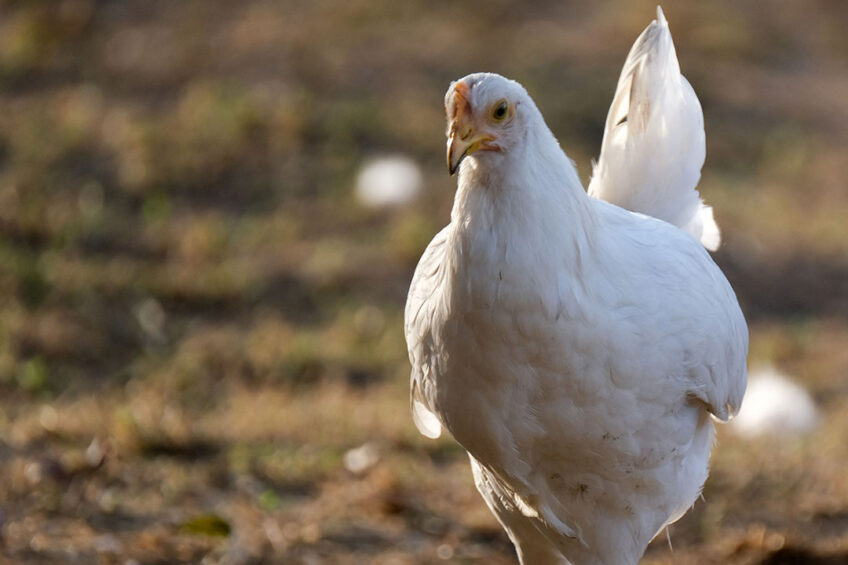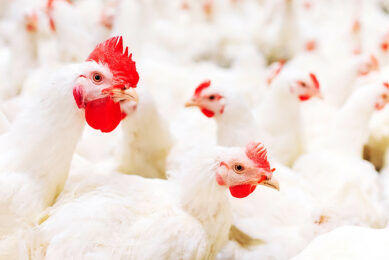Probiotics that alleviate heat stress impact in poultry

Global climate change is accelerating at an unprecedented rate and the consequent high environmental temperature is an inhibiting factor in some poultry-producing countries. This article will discuss dietary supplementation of probiotics in poultry to counteract the deleterious impacts of heat stress.
Heat stress compromises health, welfare, performance, and productivity of the birds by decreasing feed intake, lowering nutrient utilisation, interrupting gut structure, and impairing the immune system. In addition, heat stress causes high mortality and severe economic losses estimated at USD$240 million per year in the US. Therefore, management and nutritional strategies are required to alleviate the adverse effects of heat stress in poultry industry.
Heat stress in poultry
Heat stress occurs when the core body temperature of the bird increases to fatal temperatures due to poor heat loss and limited coping means. Birds are homeotherms with a limited thermal neutral zone from 18°C to 30°C. When the ambient temperature surpasses the upper limit of the thermal neutral zone and the temperature-humidity index exceeds 21°C, birds cannot efficiently regulate body heat and are exposed to heat stress. Heat stress (HS) influences birds in 2 forms of acute (short-term heat exposure) or chronic (long-term heat exposure).
Impact of HS on gut morphology and microbiology
Heat stress damages the gut morphology and barrier integrity leading to compromised digestive and absorptive capacity and enhanced permeability to luminal antigens and toxins. To dissipate extra heat the systemic blood flows diverts from internal organs to peripheral circulation causing ischemia and hypoxia in the gut epithelial cells, thus compromising gut morphology and integrity of birds exposed to heat stress. In addition, corticosterone delays proliferation of the gut epithelial cells, lowers gut villus height and crypt depth, impairs gut mucosa, induces the production of proinflammatory agents, and increases mucosal permeability to pathogenic antigens in birds exposed to high temperature.
Furthermore, heat stress distorts gut microbiota composition and alters the regulation of gut epithelial cell turnover, epithelial restitution, and reorganisation of tight junctions which in turn provokes changes in gut morphology and integrity.
Impact of HS on physiology and immune system
Heat stress detrimentally affects the metabolic status and physiological equilibrium in birds. Heat stress reduces sodium and potassium levels in blood, decreases partial pressure of carbon dioxide, disturbs acid-base balance, resulting in respiratory alkalosis. In addition, heat stress lowers serum concentrations of hemoglobin, triiodothyronine, plasma protein, uric acid, and high-density lipoprotein cholesterol, while enhancing serum concentrations of corticosterone, triglycerides, total cholesterol, and low-density lipoprotein cholesterol. Short-term heat exposure increases blood glucose level; however, long-term heat exposure declines blood glucose level of birds. Furthermore, heat stress impairs immune function, impacts antioxidant enzymes, enhances the vulnerability to infection, and increases the mortality and morbidity rates.
Impacts of heat stress on performance
Heat stress decreases egg production in laying hens, due to poor appetite, reduced feed intake, impaired digestion and metabolism, altered endocrine status, increased corticosterone hormone, metabolic shifts at the systemic and cellular levels, and changes in body composition.
Impact of probiotics on gut morphology and microbiology
Probiotics prompt beneficial impacts on the gut microbial diversity and population, and gut morphology and integrity in poultry subjected to high ambient temperature. Different type and dose of probiotics have various effects on different segments of gastrointestinal organs. Probiotics regulate the level of corticosterone and control the excessive release of proinflammatory agents to reverse impaired villus-crypt structure, gut tissue injuries, and increased gut permeability of heat-stressed birds. Mucus layer covers gut absorptive surface, acts as a barrier against bacterial invasion, and maintains gut integrity of poultry. Heat stress decreases the number of mucus-producing goblet cells located in the ileal villi in quails. Probiotic Bacillus licheniformis maintains goblet cell counts in the ileum and caecum of heat-stressed hens. Lactobacillus-based probiotics increase goblet cell counts in the duodenum and jejunum of heat-stressed broilers by modulating mucin mRNA expression and accelerating the differentiation of goblet cells. Supplementing probiotics mixture of Bacillus licheniformis, Bacillus subtilis and Lactiplantibacillus plantarum in the diet ameliorates the increased gut mucosal permeability of heat-stressed broilers by improving transepithelial electrical resistance. Probiotic mixture of Lactiplantibacillus plantarum, Lactobacillus acidophilus, Lactobacillus bulgaricus, Lacticaseibacillus rhamnosus, Bacillus bifidum, Streptococcus thermophilus, Enterococcus faecium, Aspergillus oryzae and Candida pintolopesii decreases serum total oxidants concentration and reverses the increased gut permeability in heat-stressed broilers. Feeding a mixture of Lactobacillus pentosus and Lactobacillus acidophilus inhibits the adverse effects of heat stress on the antioxidant capacity of liver by producing bioactive substances with free radical chelating ability.
Impact of probiotics on physiology and immune system
Probiotics reduce circulating level of corticosterone, increase serum concentration of thyroid hormones (T3 and T4), thus improving digestion and metabolism in heat-stressed broilers. Probiotic Protexin Boost enhances uric acid level in the serum, indicating the reduced protein digestibility in heat-stressed birds and increases haemoglobin concentration, but Lactobacillus species and yeast culture increase total plasma protein indicating high protein digestibility. The increased level of uric acid alleviates the oxidative damage following heat stress in birds. Probiotics lower heterophil to lymphocyte ratio and restore the normal function and development of immune system, while enhancing antibody responses and leukocytes count in birds reared under hot temperature. Probiotic Bacillus licheniformis reverses the decreased number of intraepithelial lymphocytes in the ileum and caecum and the increased count of mast cells in laying hens subjected to heat stress, thus preventing the excessive inflammatory responses in the gut, and improving immune system. Lactobacillus-based probiotics alleviate the increased count of intraepithelial lymphocytes in gut segments of heat-stressed broilers, thus maintaining mucosal immune response balance.
Impact of probiotics on performance
Probiotics improve poultry metabolism and growth performance by increasing the digestive enzyme activity, decreasing bacterial enzyme activity, improving protein digestibility, and decreasing ammonia production. A mixture of Lactobacillus pentosus and Lactobacillus acidophilus improves the growth and feed conversion ratio of heat-stresses broilers. Dietary supplementation of Bacillus subtilis increases the growth performance, and supplemental probiotics containing Bacillus licheniformis, Bacillus subtilis and Lactiplantibacillus plantarum improve feed to gain ratio of broilers reared under hot temperature. Lactiplantibacillus plantarum, Lactobacillus bulgaricus, Lactobacillus acidophilus, Lacticaseibacillus rhamnosus, Bacillus bifidum, Bacillus licheniformis, Streptococcus thermophilus, Enterococcus faecium, Aspergillus oryzae, and Candida pintolopesii enhance egg production and feed intake in heat-stressed laying hens.
Probotics show promising results
Heat stress is a major health and welfare concern in poultry production systems compromising gut morphology and microbiology, physiology, immune system, and performance of poultry. Probiotics improve gut microbial ecology and morphology, physiological conditions, immune system, and performance of heat-stress birds. However, further research is needed to evaluate the optimum dosage of probiotic supplementation.
Reference provided upon request.







